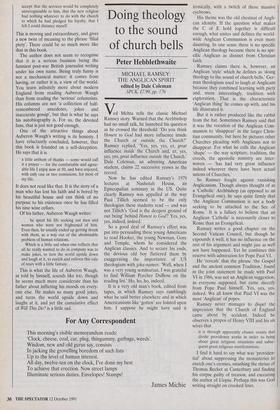Doing theology to the sound of church bells
Peter Hebblethwaite
MICHAEL RAMSEY: THE ANGLICAN SPIRIT edited by Dale Coleman SPCR £7.99, pp. 176 Ved Mehta tells the classic Michael Ramsey story. Warned that the Archbishop had no small talk, he launched his question as he crossed the threshold: 'Do you think Honest to God had more influence inside the Church or outside the Church?' Ramsey replied, 'Yes, yes, yes, er, great influence inside the Church and, er, yes, yes, yes, great influence outside the Church.' Dale Coleman, an admiring American student, claims 22 successive yesses as the record.
Now he has edited Ramsey's 1979 lectures at Nashotah House, an Episcopalian seminary in the US. Quite clearly Ramsey was appalled at the way Paul Tillich seemed to be the only theologian these students read — and was not Tillich's 'God is the deepest ground of our being' behind Honest to God? Yes, yes, yes, indeed, indeed.
So a good deal of Ramsey's effort was put into persuading these young Americans to read Hooker, the young Newman, Gore and Temple, whom he considered the Anglican classics. And to secure his ends, the devious old boy flattered them by exaggerating the importance of US theologians with joke-names: `Well, when I was a very young seminarian, I was grateful to find William Porcher DuBose on the reading list.' Ho, ho, ho, indeed.
It is a very old man's book, edited from tapes, in which Ramsey says ramblingly what he said better elsewhere and in which Americanisms like `gotten' are foisted upon him. I suppose he might have said it ironically, with a twitch of those massive eyebrows.
His theme was the old chestnut of Angli- can identity. If the question what makes the C of E hold together is difficult enough, what unites and defines the world- wide Anglican Communion is even more daunting. In one sense there is no specific Anglican theology because there is no spe- cific Anglican as distinct from Christian faith.
Ramsey claims there is, however, an Anglican 'style' which he defines as 'doing theology to the sound of church bells.'Ger- man theologians used to laugh at Anglicans because they combined learning with piety and, more interestingly, tradition with exploration. That is the characteristic `Anglican thing' he comes up with, and his life illustrated it.
But it is rather produced like the rabbit from the hat. Sometimes Ramsey said that it was the vocation of the Anglican Com- munion to 'disappear' in the larger Chris- tian community, but here he pictures other Churches pleading with Anglicans not to disappear. For what he calls the Anglican `shape' — the way scripture, tradition, the creeds, the apostolic ministry are inter- woven — 'has had very great influence indeed wherever there have been actual unions of Churches.'
So Ramsey fought against vanishing Anglicanism. Though always thought of as a 'Catholic' Archbishop (as opposed to an Evangelical one), he says quite firmly that `the Anglican Communion is not a body seeking to be attached to the See of Rome.' It is a fallacy to believe that an Anglican `Catholic' is necessarily closer to Rome than an Evangelical.
Ramsey writes a good chapter on the Second Vatican Council, but though he expounds it well, it has no influence on the rest of his argument and might just as well not have happened. Yet he combines this reserve with admiration for Pope Paul VI.
He 'reveals' that the phrase 'the Gospel and the ancient common Tradition,' found in the joint statement he made with Paul VI in 1966, was not an Anglican suggestion, as everyone supposed, but came directly from Pope Paul himself. Yes, yes, yes, indeed. We all knew that Paul VI was the most 'Anglican' of popes.
Ramsey never manages to dispel the impression that the Church of England came about by accident. Indeed he observes a propos of Henry VIII and his six wives that
it is through apparently chance events that divide providence works in order to bring about great religious situations and subse- quent great religious manifestations.
I find it hard to say what was 'providen- tial' about suppressing the monasteries to enrich one's cronies, smashing the shrine of Thomas Becket at Canterbury and finding his corpse guilty of treason, and executing the author of Utopia. Perhaps this was God writing straight on crooked lines.


























































 Previous page
Previous page